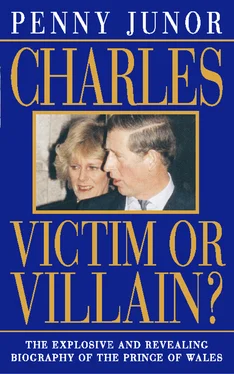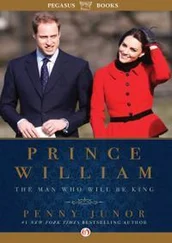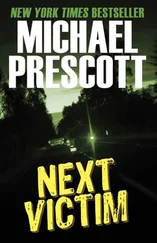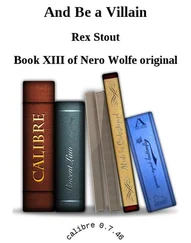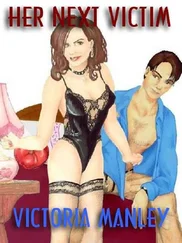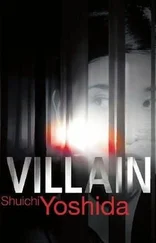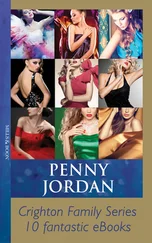Mountbatten’s murder had an unimaginable impact on the Prince’s life; it knocked him entirely off-balance. As he wrote in his journal on the evening he heard the news, ‘Life has to go on, I suppose, but this afternoon I must confess I wanted it to stop. I felt supremely useless and powerless …
‘I have lost someone infinitely special in my life; someone who showed enormous affection, who told me unpleasant things I didn’t particularly want to hear, who gave praise where it was due as well as criticism; someone to whom I knew I could confide anything and from whom I would receive the wisest of counsel and advice.’
Mountbatten had criticised the Prince of Wales, most notably for his selfishness, but he also made him feel he was loved and valued, which neither of his parents had ever been able to do. Where his father had cut the ground from under his feet, Mountbatten had built him up, listened to his doubts and his fears, rebuked him when he felt he had behaved badly, encouraged him, cajoled him, provided a sounding board for his wackier ideas, a shoulder to cry on, and given him some much needed confidence. There was no one else in his life at that time who could do this.
From the time when Charles was so touched by their exchange on the hay bale, to the announcement of their engagement, the romance was brief – less than seven months – and their moments alone were rare, but throughout the course of the relationship, Diana was in charge. She knew what she wanted and she went all out to get it. She had cherished her dream of marrying the Prince since their first meeting three years before, and with great cunning ensured her dream came true. She had always said since she was a small child that when she grew up she was going to be someone special. Her siblings called her ‘Duch’ – because she was determined to be a duchess at the very least. When the opportunity arose, she threw herself at the Prince, quite blatantly and brazenly. Yet it was only the more astute of Charles’s friends who realised what was going on. He didn’t appear to notice. Like most men he was easily flattered, particularly by a pretty young woman who professed great interest in everything he said and did, and manifested great sympathy and understanding for the trials and tribulations of his life. He found her quite intoxicating, and she was willing and amenable to do whatever might please him. She slotted neatly into whatever plans he already had, she talked about her love of the country and of shooting and her interest in taking up horse riding, and she liked his friends. And crucially, she made him laugh. She was fun.
But it was all a sham. Diana didn’t like any of these things. She hated the countryside, had no interest in shooting or horses, or dogs, and she didn’t even really like his friends. She found them old, boring and sycophantic. What she enjoyed was the city. She liked shopping in expensive Knightsbridge department stores, and lunching in smart London restaurants. She liked cinema and pop music.
Diana was a victim, who needed love and attention and constant reassurance – needs she carried to an exaggerated degree from her childhood. Her mother, Frances Shand Kydd, had run away from a violent and unhappy marriage when Diana was six years old and the experience of that loss – her feeling of rejection that followed when her mother disappeared – left deep scars in Diana’s psyche.
Frances Shand Kydd has been unfairly maligned for deserting her children, not least by Mohamed al Fayed when they attended an investigative meeting in Paris in June 1998 about the crash that killed both their children. He lashed out at her, saying, ‘She didn’t give a damn about her daughter … If you leave a child when she’s six years old how can you call yourself a good mother?’
Whatever her qualities as a mother, Frances had every expectation when she left home for good just before Christmas in 1967 that it would be a temporary separation. She intended to sue her husband for divorce on the grounds of cruelty, and it was unthinkable for a mother in these circumstances not to be given custody of young children. Her husband, Johnnie Althorp, who later became the eighth Earl Spencer on his father’s death, was a well-respected, genial, if rather dim, member of the aristocracy. He had been an equerry to George VI, then to Queen Elizabeth II.
Abuse ran in the Spencer family marriages and their thirteen years together had not been happy. To compound her misery, Frances had lost a child, a baby boy called John, born after Jane and Sarah, in January 1960, who only lived for ten hours. Diana was born eighteen months later, and then in May 1964 Frances gave birth to another boy, Charles, the son and heir her husband so badly wanted.
Shortly afterwards she met and fell in love with Peter Shand Kydd, a wealthy married businessman. Their affair broke up both marriages, and Frances seized the opportunity to escape. In the autumn of 1967 she and Johnnie had a trial separation, and at Christmas it became permanent and she left the family home. But her plans to sue for cruelty went badly awry. Shand Kydd’s wife, Janet, sued him for divorce on the grounds of his adultery with Frances. With that proven, Frances had no defence when Johnnie also sued for divorce because of their adultery. The cruelty suit was thrown out, and in the custody proceedings that followed, he brought some of the most influential people in the land to speak up for him – including her own mother, Ruth, Lady Fermoy, a considerable snob, who was said to have been appalled that her daughter had run off with a man ‘in trade’ – albeit a millionaire.
As a result, custody of Jane, Sarah, Diana and Charles was given to their father, who employed a string of itinerant nannies to take care of them. Frances was only allowed to have them on specified weekends and parts of the school holidays.
Diana said, ‘It was a very unhappy childhood … Always seeing my mother crying … I remember Mummy crying an awful lot and every Saturday when we went up for weekends, every Saturday night, standard procedure, she would start crying. On Saturday we would both see her crying. “What’s the matter, Mummy?” “Oh, I don’t want you to leave tomorrow.”’
One of Diana’s other early memories was hearing her younger brother Charles sobbing in his bed at the other end of the house from her room, crying for their mother. She understood none of what had gone on between her parents. All she could see, like any small child in a similar situation, was that her mother didn’t want her any more. She told Andrew Morton that she began to think she was a nuisance, and then worked out that because she was born after her dead brother, she must have been a huge disappointment to her parents. ‘Both were crazy to have a son and heir and there comes a third daughter. “What a bore, we’re going to have to try again.” I’ve recognised that now. I’ve been aware of it and now I recognise it and that’s fine. I accept it.’
Rightly or wrongly, Diana felt rejected, worthless and unwanted. Those were the feelings she nursed throughout her childhood and teenage years and, three weeks after her twentieth birthday, took with her into marriage. She was still desperately seeking love and reassurance.
Her mother’s departure was not the end of the trauma in Diana’s young life. In June 1975, shortly before her fourteenth birthday, her paternal grandfather died and her father inherited the title and the ancestral home, Althorp. It meant an upheaval from Norfolk, where she had friends and roots, to Northamptonshire, where she knew no one. Worse still, her father, whom the children had had more or less to themselves for the last eight years, had taken up with a formidable woman, Raine, Countess of Dartmouth, daughter of the romantic novelist, Barbara Cartland, mother of four and former member of Westminster City Council, the London County Council and the Greater London Council. To the children’s horror, the couple were married just over a year later, and the woman one of her friends described as ‘not a person but an experience’ took over Althorp and all who lived in it.
Читать дальше
